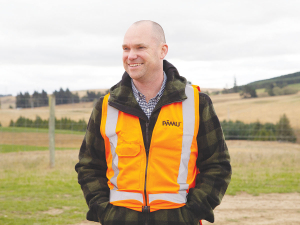State Farmer Delivers Solid Half-Year Result
State farmer Landcorp, trading as Pamu, is a forecasting a full-year net profit of around $100 million.
 Pamu chief operating officer Will Burrett says some very good operators left to become contract milkers because they couldn’t offer them that opportunity.
Pamu chief operating officer Will Burrett says some very good operators left to become contract milkers because they couldn’t offer them that opportunity.
In a landmark move, the state-owned farmer Pāmu (Landcorp) is making four of its 44 dairy farms available for people wishing to take up various contracts including herd-owning, share milking, variable order share milking and contract milking.
This is the first time that any of its farms have been made available in this way and is seen as a move to drive 'shareholder value', meaning a better return to the Government who owns the conglomerate.
The move is expected to free up capital for the state-owned enterprise and to put performance at the forefront of its decision-making.
Two of the farms are located near Taupo in what is known as the Broadlands hub, one in Canterbury and another near Greymouth on the West Coast of the South Island. Pāmu says the farms range in size from 400 to 1000 cows.
Pāmu chief operating officer Will Burrett says in the past they had the mechanism to develop people internally, within the context of their own internal management systems.
But they lacked the ability to hold onto them as they matured and wanted to take the next step - to gain some form of equity.
"Sharemilking is really the pathway of equity growth into farm ownership, so for us to be able to offer that to our people is a natural evolution in our pathways of opportunity that we need to be providing," he told Dairy News.
Burrett says those taking up one of the options will not be able to end up buying the farm, but in future this may change, depending on the expectations of the shareholder - the Government.
He says at this stage Pāmu is offering a vehicle of equity growth for people to build their equity and buy either properties or other interests.
"So at the moment it will be growing equity within an operational framework, not a land ownership framework within Pāmu," he says.
The contracts any people sign with respect to sharemilking or other forms of contracting will be the same as offered in the private sector, says Burrett. He says such contracts are well known and tried and true.
He adds that those taking up such contracts will have access to courses and other benefits offered to other Pāmu staff, and in future, such courses may change to meet the new needs of these people.
According to Burrett, Pāmu doesn't have a problem retaining staff but acknowledges that in the past they have lost very good operators who have gone onto the next step of contract milking because they couldn't offer them that opportunity.
He says one of the factors behind this latest move is driving high performance across the company.
"The reality is that when people have skin in the game, as for example a sharemilker does, they tend to lift the bar because there is an incentive to do so," he says.
Burrett says when the bar is lifted, it's like an incoming tide where all boats rise.
When a farmer looks over the fence and sees their neighbour performing well, that often incentivises them to lift their game. He says the hope is this may happen within Pāmu.
NZPork says the Government needs to strengthen its proposed planning laws to ensure New Zealand's pig farmers can continue to produce pork.
Good news for kiwifruit growers - a record crop with forecast per hectare returns at record levels for all fruit categories for the 2025-26 season.
As guests gathered on what is known as the Speaker's Lawn - a beautifully manicured patch of grass behind the main buildings of Parliament - to mingle and enjoy a lamb chop to celebrate National Lamb Day, the mood was very much upbeat.
Global dairy prices are on a roll, recording a fourth consecutive jump on the Global Dairy Trade (GDT) auction this year.
Booming primary sector exports are helping lift earnings for farm service providers.
The world is waking up to the disadvantages of carpets derived from petrochemicals, creating opportunities for New Zealand strong wool.
OPINION: Staying with politics, with less than nine months to go before the general elections, there’s confusion in the Labour…
OPINION: Winston Peters' tirade against the free trade deal stitched with India may not be all political posturing by the…